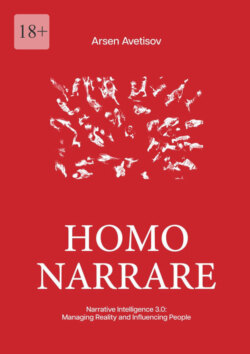Читать книгу Homo narrare. Narrative Intelligence 3.0: Managing Reality and Influencing People - Арсен Аветисов - Страница 13
PART ONE. NEUROPHYSIOLOGY
A Multitude of Intelligences
If you are smart, where does your intelligence reside?
ОглавлениеWe did the impossible because we didn’t know it was impossible.
Anonymous
Humanity has survived mainly by countering the brute strength and agility of its environment with intellect. Today, we ask how and why a light appeared at the end of the evolutionary tunnel – the transformation of neural tissue into gray matter, the source of intelligence. Was it due to labor activity fostering new neural connections, walking on two legs that redirected and increased blood flow to the brain, or perhaps the constant need to replenish energy for movement and cognitive processes?
Humans avoided becoming just another link in the food chain because the brain gained a universal weapon: intelligence. This weapon enables strategies, adapts to circumstances, plans changes, organizes battle formations, and coordinates orderly retreats.
The term «intellect» comes from the Latin word meaning «understanding» or «cognition.» It encompasses not just the general ability to understand and learn but also the capacity to solve problems, achieve goals, and accomplish what we associate with personal success and happiness today.
Among the various types of intelligence, IQ (intelligence quotient) is the most recognized. Its prominence comes from the long history of IQ testing, the simplicity of representing results as a single, comparable number, and the standardization of tests, which aids in predicting professional qualities. IQ measures abilities such as setting goals, planning, strategizing, learning, and applying abstract concepts. However, it is now evident that IQ alone does not fully capture a person’s potential or guarantee life success. External factors, like iodine supplementation in developing countries, have even been shown to raise IQ scores. Ultimately, IQ tests demonstrate how well someone can take IQ tests.
To better understand the full range of brain capabilities, scientists and theorists concluded that one type of intelligence is insufficient. The theory of multiple intelligences emerged, proposing nearly ten distinct types. Each type reflects a dominant functional quality, making it easier for individuals to succeed professionally by leveraging their strongest type.
Joel Davitz and Michael Beldoch first highlighted this issue in 1964, and Howard Gardner laid the groundwork for the theory in 1983. Gardner, regarded as its founder, initially identified six types of intelligence, which later expanded. These include:
– Linguistic intelligence: Proficiency in written and spoken language.
– Logical-mathematical intelligence: The ability to handle numbers and logical operations.
– Musical intelligence: Sensitivity to rhythm, tone, and sound.
– Visual-spatial intelligence: Orientation and understanding of spatial relationships.
– Naturalistic intelligence: Awareness and understanding of nature.
– Kinesthetic intelligence: Physical coordination and body movement.
– Social and intrapersonal intelligence: Skills in social interactions and self-awareness.
As new professional fields and activities emerge, the list of intelligences may grow further.
Regardless of profession, there are core abilities that impact daily life and significantly shape one’s destiny. These are:
– IQ (intelligence quotient): The ability to learn, reason, remember, and solve problems.
– EQ (emotional quotient): Emotional intelligence, the ability to understand and manage one’s own and others’ emotions effectively.
– NQ (narrative quotient): Narrative intelligence, the least studied yet most critical ability to interpret and influence behaviors – both one’s own and others’ – to achieve goals.
NQ, in particular, governs how we manage people, moods, and entire lives. As the saying goes: «The one who knows remains silent, the one who speaks does not know.» Perhaps this is because narrative intelligence plays the leading role in shaping systems of human behavior and overall existence.
